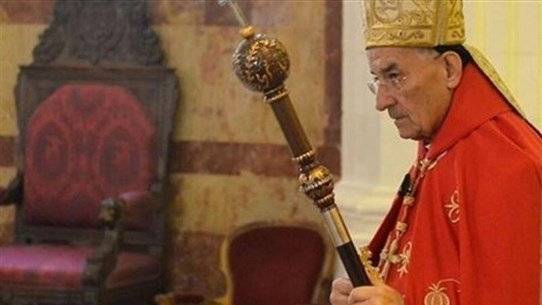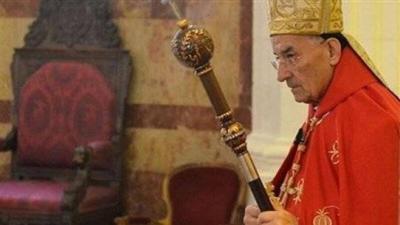Maronite Patriarch Bechara Boutros al-Rahi welcomed the return of Gulf Arab ambassadors to Beirut, affirming that this return makes Lebanon feel like an active member of the Arab family and its league. He considered this a sign among three signs that appeared last week, carrying positive indicators regarding the Lebanese file, emphasizing that "we want to come out of the ballot boxes with Lebanon's identity, not just the names of MPs."
In his Palm Sunday sermon yesterday, al-Rahi stated that Lebanese people and their children live in poverty and deprivation "due to the political, economic, financial, and social crises caused by the senior political leaders."
He pointed out that three signs appeared this week: the announcement of Pope Francis' visit to Lebanon next June, a preliminary agreement with International Monetary Fund experts, and the return of Gulf diplomats to Lebanon. He added, "These positive steps come while important developments are occurring at both regional and international levels, and we hope that the Lebanese state will benefit from them and employ them within the national framework above all."
Al-Rahi viewed Pope Francis' visit as part of the Vatican's efforts to help Lebanon out of its deep crisis and keep it within the democratic nations system. He noted that this visit continues a series of papal visits including Pope Paul VI on his way to India in 1964, Pope John Paul II in 1997 to sign his apostolic exhortation "New Hope for Lebanon," and Pope Benedict XVI in 2012. Al-Rahi said, "Pope Francis' visit represents a blessing for the people, hope for the nation, and a warning to the officials. The Pope is keen for Lebanon to enjoy good governance and a political community that places the common good above all considerations. He is aware of the shortcomings in confronting the issues of the people courageously and seriously, and the hesitation in the state's response to international efforts."
Regarding the return of Gulf ambassadors to Lebanon, particularly the ambassadors of Saudi Arabia and Kuwait, he stated, "This return serves to strengthen the bonds of friendship and cooperation between these countries and Lebanon. Lebanon is a loyal friend to them, and tens of thousands of Lebanese work in these countries, contributing to their growth and prosperity with their expertise and achievements. Local authorities, for their part, appreciate their activity and loyalty. This return makes Lebanon feel as an active member of the Arab family and its league."
Al-Rahi emphasized that serious preparations for the parliamentary elections on May 15 are a means "to make a difference between the present and the future by forming a parliamentary council that realizes the dream of change and the will of the people," pointing out that "this will not happen without a high turnout." He stated, "It is the duty of the Lebanese to exercise their right, indeed their role, in the revival of the nation. Parliamentary elections are a national responsibility in circumstances that require renewing the political life and the political community, changing performance and choices."
He called for these elections to be "a democratic means to hold the wrongdoers, failures, and corrupt accountable, and to elect those with steadfast positions, rescue proposals, and national choices that have constituted the raison d'être of Lebanon and its success in the past, foremost among them addressing social, economic, and educational issues, returning to neutrality, achieving broad decentralization, demanding an international reform conference, and enhancing Arab belonging and global openness." He added, "We want what comes out of the ballot boxes to be not only the names of MPs but the identity of Lebanon."
Meanwhile, Archbishop Elias Audi, Metropolitan of Beirut and its vicinity for the Greek Orthodox, launched an attack on the Lebanese officials, stating that "while dictatorships have largely been defeated around the world, the systems that are said to be democratic, as in our country, invent exquisite methods to preserve the interests of the elite and their gains to maintain their power."
Audi asked, "Isn't the honest judiciary suppressed in our country? Aren't there evidence and facts hidden in service of influential people? Does the victim not become the oppressor due to files that appear overnight? Is the poor not robbed of his pennies to keep the rich with their millions?"




